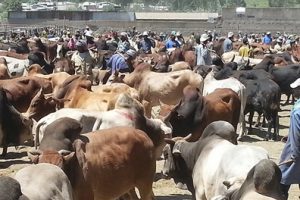
In a remarkable turn of agricultural fortune, Ethiopia has ascended to the status of the largest wheat-producing country in Africa, as announced by Prime Minister Abiy Ahmed (PhD). This achievement, while met with some skepticism, stands as a testament to the nation’s strategic agricultural policies and commitment to economic development. The Prime Minister’s assertions emphasize the tangible progress Ethiopia has made in the agricultural sector, particularly in wheat production.
Prime Minister Abiy revealed that Ethiopia has cultivated over seven million hectares of land for wheat this year alone. This expansive cultivation is projected to yield an impressive production of at least 300 million quintals. Such figures not only reflect the scale of agricultural activity but also underscore the government’s focus on enhancing food security and self-sufficiency.
The Prime Minister further elaborated on the government’s comprehensive 10-year development plan aimed at bolstering the economy. This plan is designed to address various economic challenges while promoting sustainable growth across sectors. Abiy’s administration has been steadfast in its efforts to realize the goals outlined in this ambitious framework, which includes significant investment in agricultural infrastructure and technology.
The economic landscape of Ethiopia has shown promising growth trends. International financial institutions had projected a regional economic growth rate of 4.2 percent for the past year, while Ethiopia itself achieved a remarkable 8.1 percent growth. This year, the outlook remains optimistic, with estimates suggesting that Ethiopia is on track to reach a growth rate of 8.4 percent. Such figures not only highlight the resilience of the Ethiopian economy but also reflect the effectiveness of the government’s policies in fostering an environment conducive to growth.
Moreover, the performance of the economic plan over the preceding eight months indicates that Ethiopia is likely to exceed its targets in the coming four months. During a recent session with the House of People’s Representatives, Prime Minister Abiy Ahmed reassured lawmakers and the public of the government’s commitment to ongoing economic reforms and agricultural expansion. His remarks underscore a broader vision for Ethiopia, one that seeks to transform the nation into a regional powerhouse in agriculture and beyond.
Several factors have contributed to Ethiopia’s remarkable progress in wheat production. Central to this success is the government’s proactive approach to agricultural policy. The Ethiopian administration has prioritized wheat cultivation, recognizing its importance for national food security and economic stability. By expanding the area under cultivation and improving access to modern agricultural practices, the government has empowered farmers to increase their yields significantly.
Investment in research and development has also played a critical role in this agricultural renaissance. The introduction of high-yield and drought-resistant wheat varieties has equipped farmers with the tools necessary to adapt to changing climate conditions and improve productivity. Additionally, initiatives aimed at training farmers in modern farming techniques have further enhanced the efficiency and effectiveness of wheat production.
Financial support services have also been pivotal in this transformation. Improved access to credit and financial resources has enabled farmers to invest in better inputs, machinery, and technologies. This financial empowerment has been crucial in driving the agricultural sector forward, allowing farmers to scale their operations and achieve higher outputs.
Furthermore, the increasing domestic and regional demand for wheat has incentivized production. Recognizing the importance of wheat as a staple food, the government has implemented policies to encourage local production and reduce dependency on imports. This strategic focus not only enhances food security but also stimulates economic growth by keeping resources within the country.
According to the Premiers explanation the country’s performance in the coffee sector is also magnificent. The country used to earn 700 million USD some 6 years ago which has grown up to over 1.4 billion USD last year. While the performance of 8 months of this fiscal year is close to 1.2 billion USD, there are hopes that the target of earning 2 billion USD is achievable. This makes the growth of the coffee sector earning more than double [or close to three folds].
The measures taken in the past couple of years have been instrumental in steering Ethiopia towards this agricultural achievement. The country’s economic future encompasses a holistic approach that integrates agriculture, industry, and services, ensuring that all sectors contribute to national development. By prioritizing food security and agricultural productivity, Abiy’s government is laying the groundwork for a more resilient and self-sufficient economy.
He further noted that, Ethiopia’s efforts to reduce its debt burden over the past years have yielded results and we have achieved debt relief of approximately $3.5 billion. He said that Ethiopia’s export earnings in the past eight months are greater than the country’s total annual exports.
He said that he has been working on debt restructuring in the negotiations related to macroeconomic reforms. He indicated that the issue we have been fighting to reduce our debt over the past year has borne fruit and a debt restructuring of approximately three and a half billion dollars has been achieved.
Regarding revenue, he said that over 580 billion birr has been collected in the past eight months; he said that since extensive subsidies have been made in terms of expenditure, the expenditure is higher than our revenue. He said that although the revenue cannot fully cover the expenditure, there are some improvements.
He stated that Ethiopia is still trying to collect about seven percent of its gross domestic product. He stated that Kenya collects more than 15.5 percent; he said that infrastructure expansion will not work if revenue is not collected.
In conclusion, Ethiopia’s emergence as the largest wheat-producing country in Africa is a significant milestone that reflects the nation’s potential and commitment to agricultural advancement. Under the leadership of Prime Minister Abiy Ahmed, Ethiopia is poised to continue its trajectory of economic growth and development.
As the nation navigates the complexities of agricultural production and economic reform, it sets a precedent for other countries in the region. The journey is far from over, but the strides made thus far herald a promising future for Ethiopia and its agricultural sector. With a solid foundation in place, the country is well on its way to achieving its vision of becoming a leading agricultural powerhouse in Africa and beyond.
BY MENGISTEAB TESHOME
THE ETHIOPIAN HERALD FRIDAY 21 MARCH 2025





